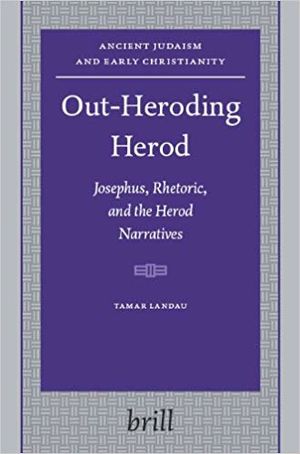Difference between revisions of "Out-Heroding Herod (2006 Landau), book"
| (3 intermediate revisions by the same user not shown) | |||
| Line 1: | Line 1: | ||
[[File:2006 Landau.jpg|thumb|300px]] | |||
'''Out-Heroding Herod: Josephus, Rhetoric, and the Herod Narratives ''' (2006) is a book by [[Tamar Landau]]. | '''Out-Heroding Herod: Josephus, Rhetoric, and the Herod Narratives ''' (2006) is a book by [[Tamar Landau]]. | ||
==Abstract == | ==Abstract == | ||
The book examines the parallel accounts of the rise, reign and fall of King Herod of Judea in the works of Flavius Josephus: Bellum Judaicum 1.204-673 and Antiquitates Judaicae 14-17. The main questions considered here concern the very existence of two separate accounts of the same historical period, the significant rhetorical differences between them, and the ways in which Josephus portrays two different images of the same man: Herod of Judea. | |||
Also under consideration here are literary and historiographical questions regarding the structure of the narratives, the implementation of rhetorical tools, the historian’s authorial voice, and the relations with earlier sources and other examples of Jewish, Greek and Roman historiography. | "The book examines the parallel accounts of the rise, reign and fall of King Herod of Judea in the works of Flavius Josephus: Bellum Judaicum 1.204-673 and Antiquitates Judaicae 14-17. The main questions considered here concern the very existence of two separate accounts of the same historical period, the significant rhetorical differences between them, and the ways in which Josephus portrays two different images of the same man: Herod of Judea. | ||
The two Herod narratives clearly demonstrate Josephus’ meticulous implementation of rhetorical tools and dramatic devices, mostly influenced by Greek historiography. A few Roman echoes and a deeper level of Jewish assumptions appear as well. Josephus’ careful composition and highly charged rhetoric is here explained by using the modern theory of narratology. Reading the Herod narratives in light of narratological concepts like focalization, order and the narrator’s voice reveals new angles for understanding Josephus’ method as a historian and new insights concerning the image of Herod and the rhetorical means used by Josephus in portraying him. | Also under consideration here are literary and historiographical questions regarding the structure of the narratives, the implementation of rhetorical tools, the historian’s authorial voice, and the relations with earlier sources and other examples of Jewish, Greek and Roman historiography. The two Herod narratives clearly demonstrate Josephus’ meticulous implementation of rhetorical tools and dramatic devices, mostly influenced by Greek historiography. A few Roman echoes and a deeper level of Jewish assumptions appear as well. Josephus’ careful composition and highly charged rhetoric is here explained by using the modern theory of narratology. Reading the Herod narratives in light of narratological concepts like focalization, order and the narrator’s voice reveals new angles for understanding Josephus’ method as a historian and new insights concerning the image of Herod and the rhetorical means used by Josephus in portraying him."--Publisher description. | ||
==Editions | ==Editions == | ||
Published in Leiden: Brill, 2006 ([[Ancient Judaism and Early Christianity]], 63). | Published in Leiden: Brill, 2006 ([[Ancient Judaism and Early Christianity]], 63). | ||
| Line 16: | Line 18: | ||
[[Category:2006| Landau]] | [[Category:2006| Landau]] | ||
[[Category:English language|2006 Landau]] | [[Category:Women Authorship--2000s|2006 Landau]] | ||
[[Category: | [[Category:Women Authorship--English|2006 Landau]] | ||
[[Category:English language--2000s|2006 Landau]] | |||
[[Category:Second Temple Studies--2000s|2006 Landau]] | |||
[[Category:Second Temple Studies--English|2006 Landau]] | |||
[[Category:Josephus Studies--2000s|2006 Landau]] | |||
[[Category:Josephus Studies--English|2006 Landau]] | |||
[[Category:Herod the Great (subject)|2006 Landau]] | [[Category:Herod the Great (subject)|2006 Landau]] | ||
Latest revision as of 12:29, 18 October 2019
Out-Heroding Herod: Josephus, Rhetoric, and the Herod Narratives (2006) is a book by Tamar Landau.
Abstract
"The book examines the parallel accounts of the rise, reign and fall of King Herod of Judea in the works of Flavius Josephus: Bellum Judaicum 1.204-673 and Antiquitates Judaicae 14-17. The main questions considered here concern the very existence of two separate accounts of the same historical period, the significant rhetorical differences between them, and the ways in which Josephus portrays two different images of the same man: Herod of Judea. Also under consideration here are literary and historiographical questions regarding the structure of the narratives, the implementation of rhetorical tools, the historian’s authorial voice, and the relations with earlier sources and other examples of Jewish, Greek and Roman historiography. The two Herod narratives clearly demonstrate Josephus’ meticulous implementation of rhetorical tools and dramatic devices, mostly influenced by Greek historiography. A few Roman echoes and a deeper level of Jewish assumptions appear as well. Josephus’ careful composition and highly charged rhetoric is here explained by using the modern theory of narratology. Reading the Herod narratives in light of narratological concepts like focalization, order and the narrator’s voice reveals new angles for understanding Josephus’ method as a historian and new insights concerning the image of Herod and the rhetorical means used by Josephus in portraying him."--Publisher description.
Editions
Published in Leiden: Brill, 2006 (Ancient Judaism and Early Christianity, 63).
